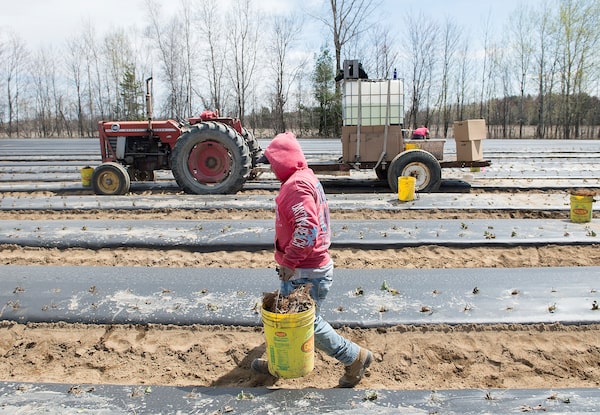
A temporary foreign worker from Mexico on a berry farm in Mirabel, Que., on May 6, 2020.Graham Hughes/The Canadian Press
Most Canadians support employers bringing in temporary foreign workers to fill jobs they can’t find Canadians to do, according to a poll for The Globe and Mail, despite growing numbers opposed to increased immigration.
The survey also found that more than eight in 10 Canadians feel that temporary foreign workers are important to the country’s economy.
And over two-thirds show support for temporary foreign workers who wish to remain in Canada becoming citizens, according to the Nanos Research poll.
The findings are released as a growing proportion of Canadians say they want the country to accept fewer immigrants in 2024 compared to 2023, with opposition to more immigration growing since September, according to other Nanos polling.
Nik Nanos, chairman of Nanos Research, said Canadians are increasingly against more immigration, but are more supportive of migrants coming to do specific jobs.
“When it comes to people coming to Canada for a purpose, such as temporary foreign workers, there’s pretty good levels of support and acceptance,” he said. “People don’t have a problem with a system that’s perceived to be orderly. Whenever there’s a sense that people are skirting around the rules, that the rules aren’t enforced, people are a little more concerned about that.“
The Nanos poll found that 79 per cent of Canadians support employers bringing temporary foreign workers into Canada to help fill jobs they can’t find Canadians to do. Backing is strongest in the Atlantic region and Quebec, with greatest opposition in the Prairies and Ontario.
However, just 57 per cent of Canadians support bringing in greater numbers of temporary foreign workers for jobs, with 49 per cent in Prairie Provinces supporting an increase. Support for more of the workers is highest in the Atlantic Provinces, and among people older than 55.
Thirty-five per cent of Canadians oppose allowing more temporary foreign workers coming to Canada for jobs, with opposition highest in Ontario, the Prairies and British Columbia.
Employers who want to hire from abroad can apply for a Labour Market Impact Assessment, a document showing there is a need for a temporary foreign worker. Once an employer obtains the document from Employment and Social Development Canada, the foreign worker can apply for a work permit.
Some jobs, including at Tim Hortons, in construction and nursing, are advertised as “LMIA approved.”
The poll found Canadians are more likely to support than oppose allowing temporary foreign workers to change employers while in Canada.
MPs and groups representing migrant workers have raised concerns that work permits tying them to one employer expose them to potential exploitation.
In an interview with The Globe last year, Tomoya Obokata, the United Nations’ special rapporteur on contemporary forms of slavery, said he found during a visit to Canada that some temporary migrants were working in appalling conditions. He said all temporary foreign workers, including those coming to Canada as seasonal agricultural workers, should be allowed to change employers so they could escape poor conditions and exploitation.
Last year, there was a marked rise in the number of temporary foreign workers coming to Canada along with an increase in foreign students, many of whom stay in Canada to work after finishing school through postgraduate work permits.
Last month, Immigration Minister Marc Miller said he plans to “rein in” the number of temporary foreign workers coming to Canada, saying there is a correlation between the influx of international students and temporary workers and the housing shortage in Canada.
Figures released in December by Statistics Canada showed the country’s population grew by more than 430,000 during the third quarter of 2023, the fastest population growth in any quarter since 1957.
Statscan estimates Canada’s population has reached more than 40.5 million, with the third-quarter increase driven largely by immigration, including about 313,000 non-permanent residents. Most of the non-permanent residents came to Canada on work or study permits.
Mr. Miller has said Canada is becoming addicted to temporary foreign workers and told a news conference in December that the system has “run a bit rampant for far too long.” He said the number of people here temporarily has “skyrocketed” over the past few years.
He signalled that he may reform the postgraduate work permit system for international students this year as well as the temporary foreign workers program. “Both represent increased volume that we’ve seen jump astronomically in the last few years, even when you net out the period during COVID-19,” he said.
“It’s something that has created some unanticipated effects and something we need to rein in. I’m prepared to do it,” he said.
The Nanos poll of 1,006 people, conducted online and by telephone between Dec. 27 and 29, has a margin of error of 3.1 per cent, 19 times out of 20.